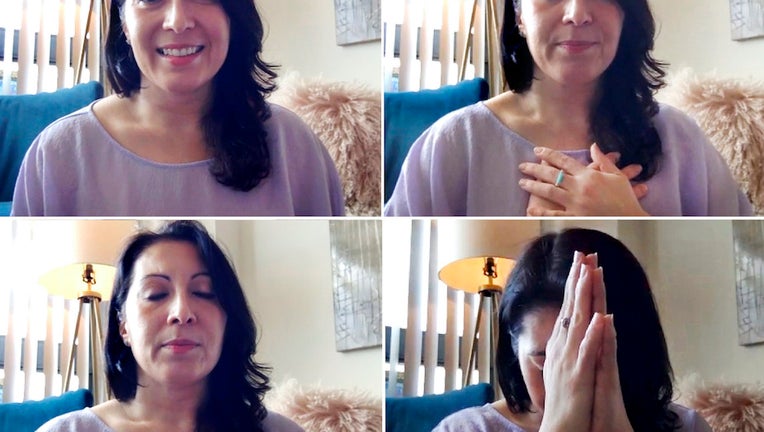Virtual volunteers help strangers cope with pandemic stress through meditation, music

Journalist Donna Borak leads an online meditation session she hosted over Zoom, March, 17, 2020. (Courtesy of Donna Borak via AP)
WINTER PARK, Fla. - Sitting cross-legged in her living room, Donna Borak rested her palm on her heart as she guided a small group of virtual participants in meditation and deep breathing. Notice where you might be holding tension, she instructed.
"Send your attention to your head ... maybe acknowledging it's OK if you've been worried and scared," she told them "Maybe finding comfort that we are all in this together."
From her Washington, D.C., home, Borak has been hosting a free virtual meditation class daily for anyone who wants "a respite during such a moment of uncertainty." Attendees are encouraged to bring children, loved ones or pets. "Even your plants."
"Inhale, maybe even a little bit more deeply this time, slowly letting the air out of your mouth."
As social distancing has emerged as a key tool to staunch the spread of the coronavirus, ordinary people around the globe have turned to technology to overcome physical barriers. In ways big and small, they are forging new connections and comforting others inundated by bad news about the virus or burdened by unpaid bills.
Borak wanted to carve out a space for togetherness — for a stressed-out parent, a manager or a laid-off employee to take a break. So far, attendees joining her class on Zoom video conferencing have mainly been friends and family, and she's been sharing sessions on Instagram.
"While a meditation class for 15 minutes doesn't solve financial stress or help to explain what will happen next or address serious health care concerns, to me, it's an opportunity to not be alone and to not exist in isolation," she said by phone. "I didn't want anyone to feel alone."
For most people, the virus causes only mild or moderate symptoms, such as fever and cough. For some, especially older adults and people with existing health problems, it can cause more severe illness, including pneumonia. The vast majority of people recover.
A journalist whose work stints included The Associated Press and who had been attending yoga teacher training, Borak draws lessons from such testing times.
"Going forward, for every time that we opted out at the last minute of attending an event or a happy hour or a dinner, we'll hopefully feel differently about it when we come back together again," she said. "We need each other."
In Austin, Texas, Catherine Woodiwiss has also gone online to provide relief of a different kind. She knew that the cancellation of South by Southwest — a film, music and technology festival that attracts hundreds of thousands to Austin — could hit artists and small business owners hard.
Her first instinct to help by buying local wasn't going to work amid the social distancing and various shutdowns. So she encouraged those who lost income to reach out online.
"I can't give a ton, but I can give something, and will as much / for as long as I can," she wrote on Twitter.
She said takers included an 18-year-old pregnant woman who works as a cashier and said her store would be closed for a month and a musician whose shows would have covered rent and other expenses.
---------
Get breaking news alerts in the FOX5NY News app. It's FREE!
---------
She used Venmo to send money directly after doing a "light vetting" of recipients by looking at their accounts. "I'm comfortable erring on the side of being of help," she said. "In a moment of need, I am comfortable giving to who asked for it."
There are "times that I have been very much in need of financial support from other people," Woodiwiss said in a phone interview. "I am very lucky to be at a moment ... where that's not true."
She's been setting aside money for a while to help with different causes. Now coronavirus is her cause — and she's part of a bigger effort. On her social media feeds, she's seen people come together in new ways, holding "singing circles" or sharing self-quarantine recipes.
Borak and Woodiwiss are among an army of virtual volunteers worldwide donating time and money. Some have used the Internet to set up food- delivery services to the elderly. One mother issued an international call for help celebrating the birthdays of her self-quarantined children.
"People are trying to figure out how to belong with each other ... when we are physically separate," Woodiwiss said. "In this moment of real, relatively unanticipated crisis, it's been really great to see people show up."

